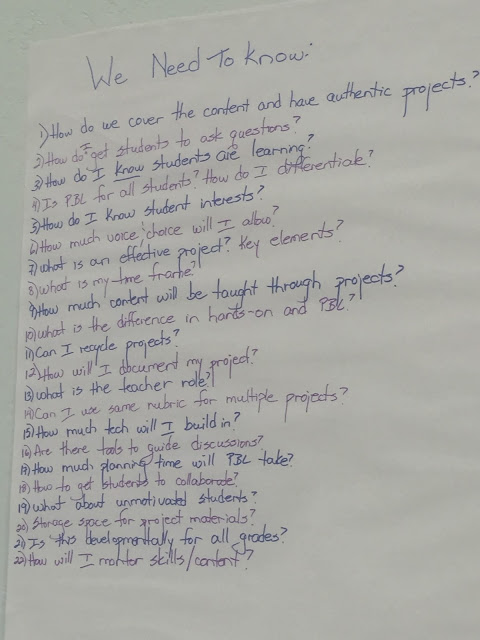On chart paper we composed drafts of project ideas with:
-Project Title
-Grade
-Project Idea (description)
-DQ
-Content (standards)
-Major Products (outcomes)
-Making it Public (publishing/presenting)
GIVING FEEDBACK DURING THE PROJECT PROCESS Austin's Butterfly: Building Excellence in Student Work from EL Education on Vimeo.
CRITIQUE GUIDELINES
-Be helpful
-Be specific
-Be kind
GALLERY WALK
For each project unit idea:
-1 I like, 1 I wonder
-Use the sticky side to write on so that people can repeat ideas and you can see where to emphasize your revisions

FEEDBACK DOCUMENTATION (edited)
-Love this!
-Podcast: What Trump can teach us about Constitutional Law / Roman Mars
-Culminating event such as the signing/ratification of the Constitution
-I wonder if you give different "histories" to groups and have them write constitutions based on that history to show how different events in a country's history might impact its constitutional values
-Possible tie-in for Level 3/T3 content
-Wonder how much needs of others need to be scaffolded
-I wonder how formal their constitutions will be. How can you scaffold this so it's different from their previous experience? Can students discuss in groups but write their own documents?
-How will students explore different points of view in addition to the constitution?
-Students could write to a representative about edits they would suggest
-I like sustained and continual revisions of their documents
-Will current events be incorporated? Evidence and explanations for revisions?
-I wonder how you will combine all voices without writing a constitution that is too general sounding
-I wonder if there could be more student voice/choice in the products
-How does peer review and critiquing come into play when looking at individual differences in political opinion (boundaries and class norms)?
-Can DQ include "did it ever" and/or "is it possible?"
HIGH QUALITY PROJECT ASSESSMENT
Sounds like...
-a conversation
-"How can I...?"
-"Next steps...?"
-Kind, helpful, specific
Looks like...
-Students engaged in reviewing comments
-Clear notes
-Logical, easy to read rubrics
-Clear expectations
Feels like...
-Supportive
-Collaborative
-Easy to follow
-Self-guided
-Logical
RELATIONSHIP BETWEEN FORMATIVE AND SUMMATIVE ASSESSMENT

PROJECT DESIGN: Student Learning Guide
Template for project design guides lives here: https://docs.google.com/document/d/1Em-0tb5WxOft3CVkucq03lIqddCgM5SPl87xfDvCQCY/edit
REFLECTING ON OUR "NEED TO KNOW" LIST

-We brainstormed a list of questions at the start of day 1, and at the end of day two we are most curious about differentiation within PBL and how to motivate students who are consistently/perpetually unmotivated.
-We can use this process of asking questions (at the start of a project) and reflecting on what we still need to know (during the project process) in our own classrooms!

No comments:
Post a Comment